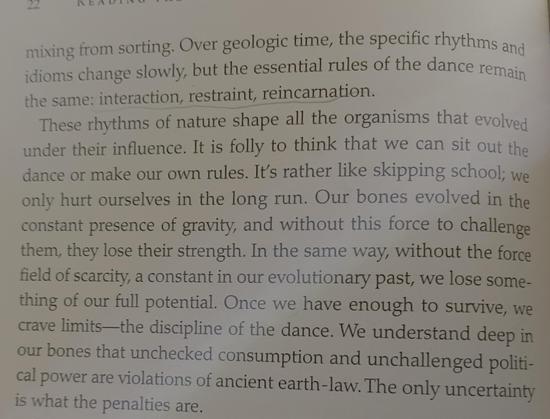2025-12-31 00:02:30
2025-12-31 00:02:30
2026-02-01 19:12:30
🌎 Detailed map reveals groundwater levels across the U.S.
#usa
2026-01-01 17:25:19
From Marcia Bjornerud's Reading The Rocks: Over geologic time, the specific rhythms and idioms change slowly, but the essential rules of the dance remain the same: interaction, restraint, reincarnation.
These rhythms of nature shape all the organisms that evolved under their influence. It is folly to think that we can sit out the dance or make our own rules ... without the force field of scarcity, a constant in our evolutionary past, we lose something of our full potential. Once we …
2026-01-25 07:01:30
2025-12-14 11:20:55
With the emergence of more processors with 64 cores or more, I'm thinking more about whether it makes sense to implement a hypercube virtualised on a single chip with a single vector of memory, or as a literal hypercube of 64 (say) RP2350s. I understand the problems of transferring data across a hypercube, but I don't have a good feeling of how the bus contention on a multicore processor scales. What should I read?
2026-01-26 00:28:33
Overuse is pushing the world toward ‘water bankruptcy’ https://news.mongabay.com/short-article/2026/01/overuse-is-pushing-the-world-toward-water-bankruptcy/
2025-11-15 18:09:32
We bought into the "post scarcity" narrative because digital tech feels so magic and ethereal but we need to get back to an understanding of the material costs and effects of those systems. They are not very post-scarce in reality.
2026-01-21 14:56:37
Comments by heads of Amazon, Microsoft, Anthropic, OpenAI and others, many delivered at the World Economic Forum in Davos, reveal a shift of narrative from optimistic inevitability towards recognition of geopolitical tensions, energy scarcity, economic bubbles and the race to make AI truly useful.
https://www.
2026-01-14 08:51:08
An interview with IMG President Adam Kelly on streaming platforms' increasing share of sports media rights, live sports as an antidote to AI content, and more (Josh Noble/Financial Times)
https://www.ft.com/content/d03bef02-0cf6-4aee-a4ab-0455cdca98cd
2025-12-08 20:57:58
Having begun reading "Post-Scarcity Anarchism" by Murray Bookchin, I might add it to my "Entry to Left-Wing Anarchist Reading" doc.
📄 Reading list: https://docs.google.com/document/d/1WuGnU7O_0eyjf9caYJXJn-KbXfsQi3uHE5EYYzQcbD8…
2025-12-16 14:52:59
Just started to read a #VOX article about the glorious AI future but I had to quit right away at this nugget: „we could all be so much more wealthier than we can even imagine today…AI and robots will be able to produce a lot more goods and services than when we have in today’s economy.“
Yeah. Because the lack of stuff that is churned out of factories and the artificial scarcity of digital goods…
2025-11-15 18:16:35
RE: https://tldr.nettime.org/@tante/115555052555644231
In fact: The "post scarcity" that the western, rich countries feel mostly comes at the cost of the global majority. Colonialism always felt "post-scarcy". Because it forces the cost …
2026-01-04 05:51:00
🇺🇦 #NowPlaying on KEXP's #SonicReducer
portrayal of guilt:
🎵 Scarcity
#portrayalofguilt
https://portrayalofguilt.bandcamp.com/track/scarcity
https://open.spotify.com/track/5m9dcQI6TqI6dmUu1qNkyA
2026-01-09 17:21:02
Stop Paying Rent on Your Own Words!
Stop paying rent on your own words. For decades, writers were taught that “real” authors have representation, an agent, sometimes even a manager, as if legitimacy were a credential issued by an industry gatekeeper. That belief was formed in an older media economy: fewer publishers, fewer channels, slower production cycles, and a cultural aura around scarcity. In 2026, the belief is not merely old fashioned.
2026-01-04 17:27:35
Is diesel behind the US takeover of Venezuela?
Diesel is the main fuel used in road transport, mining and quarrying, and agriculture. Fuel oil is used in shipping but with the regulations of 2020 on sulphur emissions, it is closer to diesel in character and this in turn impacts on the scarcity of diesel.
The US has to import the crude oil to make diesel. Its own crude is too light
Venezuela's oil is very heavy.







